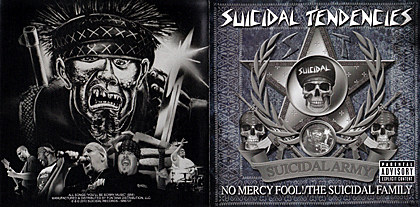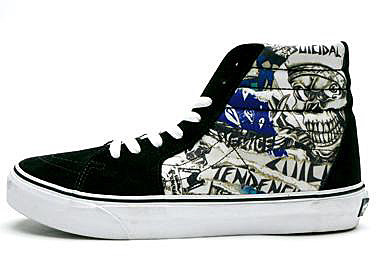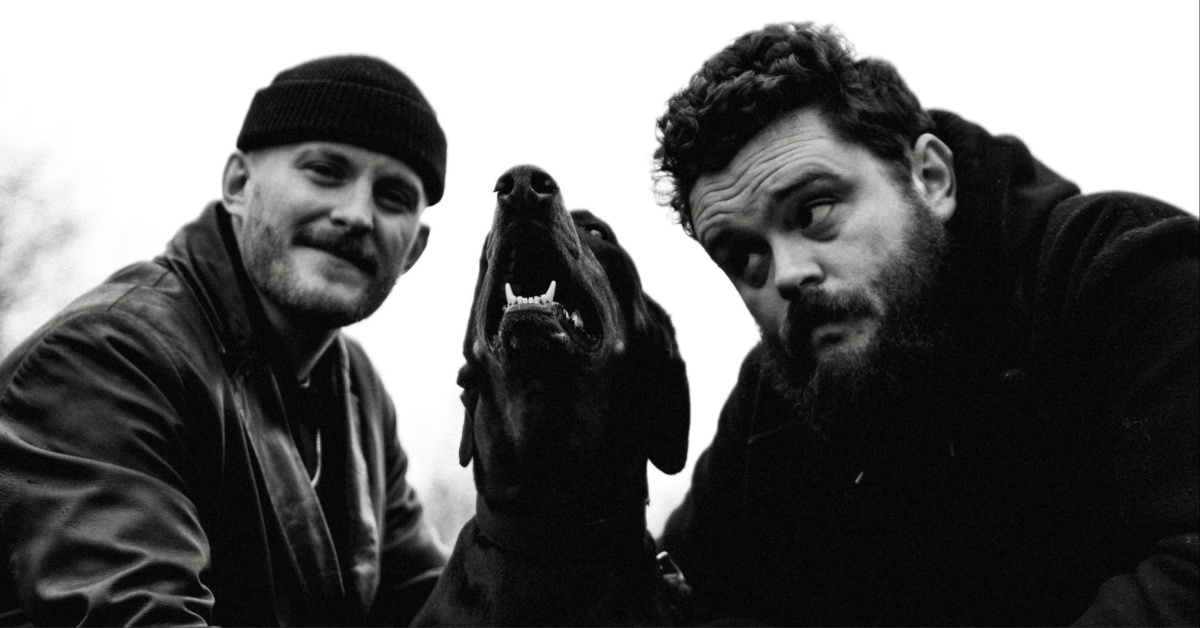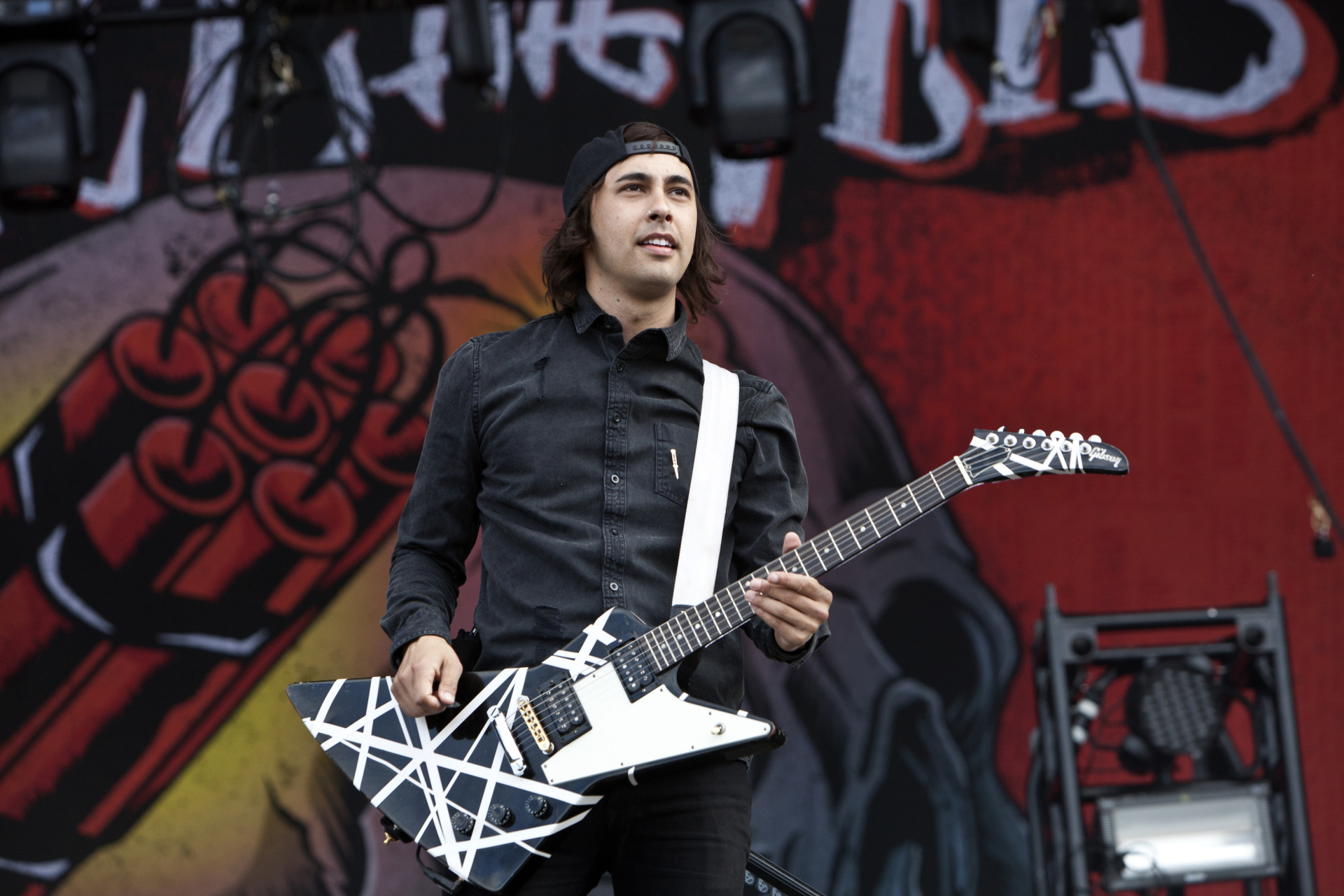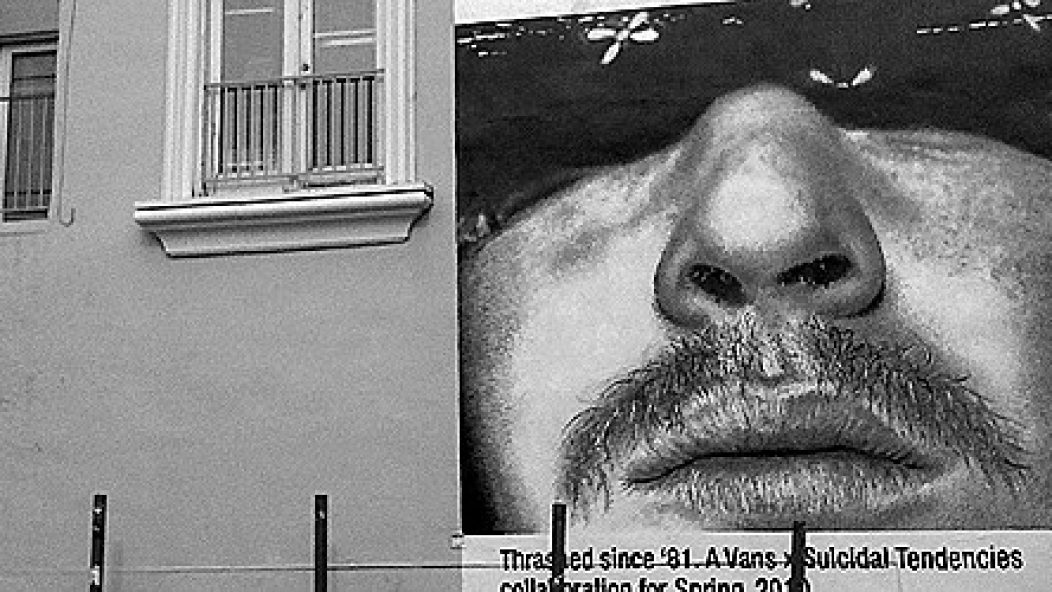
Interview: Suicidal Tendencies
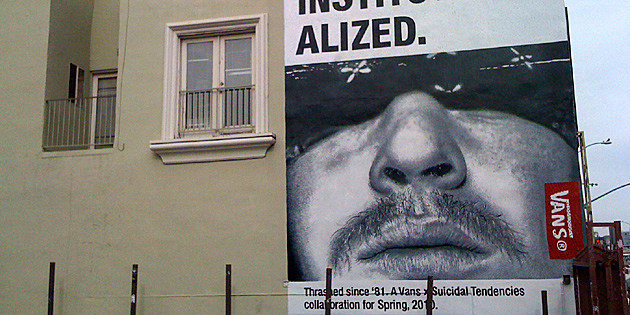
. . .
Mike Muir is a busy man. The vocalist of Suicidal Tendencies appeared on three releases this year, all out on the band’s Suicidal Records label.
- Live at the Olympic Auditorium
is Suicidal Tendencies’ first DVD. It is one of the most joyful DVDs I have ever seen. Despite a set list mostly drawn from the early ’80s, the music comes across as fresh and timeless. For proof of the positive power of hardcore punk (and a little thrash), look no further. Seeing little kids go nuts to jams from Suicidal’s first record gives me hope for the future.
- Funk It Up & Punk It Up: Live in France ’95
is a double live album. It is a document of a joint European tour by Muir’s solo band Cyco Miko and funk metal legends Infectious Grooves. In true Suicidal family fashion, both bands have the same lineup. The sound quality isn’t great, but Robert Trujillo’s slaptastic bass is a gas. Infectious Grooves play their first US show in 10 years on November 23 at the House of Blues in Hollywood, CA. (See flyer here.) Evidently a new album is in the works.
- No Mercy Fool!/The Suicidal Family
is also a split release (sort of), but on one disc. Suicidal Tendencies is the album artist, but the band re-records songs from Suicidal’s second album, Join the Army, and No Mercy, the thrash side project of Muir and Suicidal guitarist Mike Clark. Re-recordings are risky, but the current Suicidal lineup is bulletproof, and the updated versions are ripping. Besides, Join the Army sounded like cack. Suicidal Tendencies just started a US tour – see dates below.
Never mind VH1 – there’s much more to Suicidal Tendencies than “Institutionalized”. For proof, read on.
. . .
“I Shot the Devil (live at the Olympic Auditorium)”
http://www.youtube.com/watch?v=vrYiACsDcOU
. . .
The DVD showed an incredible age range in your crowd. Was this something you actively cultivated?
I don’t think that’s anything you really have any control over. We played up in San Jose, and we had four generations: great-grandfather, grandfather, their kid, and their kid. That’s the first time I’ve ever been with four generations of people. And then we played in Arizona a couple weeks later. There were 27 people from the same family all there. I got my picture taken with them – brothers, cousins, their kids, and all that, straight off the reservation. That’s something that you never would have expected when we started out. And there’s quite a diversity in [the band’s] following, which I think is really cool. It just makes thing a little more exciting and keeps it from being stale and boring. I feel fortunate for it. I don’t think you can make plans for something like that.
Why do you think kids are getting into Suicidal now even though the band doesn’t put out records frequently?
I think there’s probably a lot of reasons. One is that for the last two years, after we did the Olympic show and I had the back surgery, we’d been doing shows again. Some people said, “If you’re doing shows, put out a record, tour the record, it may be your last chance”. And I’d go, “I don’t believe in last chances, and that’s not what it is”. I want not to have people [come] for nostalgia. I want them to go there for a reinvigoration. I want to remind people that love Suicidal of why they love Suicidal and make them love us even more. And I think that’s what we’ve done.
With Suicidal, we just did three shows in Australia in December. We got all the people from Australia that were on the mailing list, emailed them, and said, “We’re going to play three places where people normally don’t play, especially foreign bands, in small areas – we’re not playing any of the capital cities – and we’re not going to do any ads. Anyone who can pass out flyers, spread the word, email your friends, cool – hopefully it will work”. We did that and sold out all three shows. [They had] amazing atmosphere. A lot of friends hadn’t seen each other in a long time. I don’t think that would have happened if we would have waited until the record was out and played the capital cities.
So we have a chance to be an old band but also be a new band. With those shows, so many of the people were people that had been into Suicidal for a long time that brought their friends. They wanted to bring them because they liked the band so much. So many people said, “Dude, we always call [the person that brought them] “Suicidal”, we call him “Cyco”, that’s his nickname, he’s wearing all [the band’s merch]. Now I know why he loves the band”.
. . .
“Cyco Vision (live at the Olympic Auditorium)”
. . .
In the DVD’s between-song banter, you remind me of a preacher. Have you always been like this?
I’ve been accused of that for a bit. There is some irony [in the fact that] the Olympic Auditorium got sold and is a Korean church now. We played a lot of the songs that we had played there in ’84. All the songs had kind of a story. No Mercy, which is me and Mike Clark’s other band before he got into Suicidal, opened up for Anthrax at the Olympic. When we did that show, Anthrax played “War Inside My Head” and I sang. All the songs we played had a [similar] basis for being on [the set list]. So we didn’t play a lot of the later stuff. We had to play, “Send Me Your Money”, of course, because [the venue] was being converted to a church.
We wanted to not go back and do show a like it was 1983 or ’84 again, but remind people of what we felt was important about that era, and how we tried to keep it in [ourselves], and not try to live in the past but take that into the future. We wanted to tell our story and say why we do [the things we do] rather than just blast through the set. We were aware, obviously, that we were being filmed, and we wanted people there to understand what was going on. And we wanted people who weren’t there, 10 or 15 or 20 years later, to see it and know what was going on.
Suicidal was something that started for fun. Now it’s obviously something much more serious. Has your conception of Suicidal changed in the quarter century that you’ve done it?
It’s all definitions. Some people think fun is like dropping a water balloon on somebody’s head that’s not expecting it. My dad said, “Fun is when you accomplish something that no one else would expect you to do, and that they couldn’t do – and they probably put you down the whole time you were doing it. That’s fun, being proud of who you are, liking who you are”.
When I was 16, I moved out and lived with my brother. One of the friends we knew had drums in his apartment. They were going to kick out his mom, so she said, “Get those drums out of here!” We said, “You can bring them here”. Someone else had a guitar. So we said, “Let’s do some songs”. We used to have rent parties every month. We would have people come over [to hear us play] and charge them, and we would use the money to pay our rent. We did that for a while and got so big that we started renting out halls where we lived. So we never really looked at it as a band. It was just an evolution.
That’s probably also one of the reasons why we’re still around. For us, [it’s a matter of] “let’s do what we love, and let’s not do what we hate”. If other people love it, great. If not, who cares about it? It’s kind of like food. If I have a pizza and I like the pizza, and someone else says the pizza is lame, am I supposed to throw up? I’m not really worried about what you like. That’s the approach we had. You don’t have to eat it. Don’t worry about it – it’s more for me.
. . .
. . .
How hard is it to run a label today when the record industry is going down the tubes?
Well, it’s past the tubes. For [a band] like us, it’s easy because we went through the whole cycle. We went from starting off in punk rock, where bands bragged about selling 5000 copies 28, 30 years ago. There wasn’t a market, so no one accused you of doing records to sell. Then you get to the point where you build up and get a following, and then people are asking you, “How many records do you think you can sell?” And I’m, like, “I’m not doing it to see how many records I can sell”. Obviously it’s great when someone loves the music for the same reason why you love it. But you’re not doing it to sell a lot. If you do, that’s great, but that’s not the point.
Now I think it’s much easier for a band like us, because records don’t sell. Whereas if you would do something and put it out years ago, people [would say], “You’re just doing it to put it out to sell”, now you can put things out that you think are cool – and it’s not to sell because they don’t sell. Someone can get it without buying it. So [now you don’t have to] defend yourself on why you’re putting something out. You can put stuff out because you think it’s cool and you want people to hear it. And you can put things out that you know are not for everybody.
Whereas for most [labels], it’s a business. The only way that business can be affected is if they do sell things. So their whole process is trying to force sales. I don’t have to worry about that. We don’t sit there and have to defend SoundScan sales. It’s not [about] how many people buy it the week it’s out, it’s [about] how many people are still listening to it 10, 15, 20 years later. That’s more important than trying to fit into a genre of what’s popular or massaging something so that people need to buy it.
With record sales disappearing, I think that the music industry will shift to selling merch. In your case, you have the Vans shoes. How did those come about?
My brother [legendary skater Jim “Red Dog” Muir] owns Dogtown Skates. He was one of the original Z-Boys, and Vans were the first people that sponsored them. When he got a new pair, I got his old pair. Every year in September, when school started, I got a new pair of pants and new pair of shoes – and I always got Vans.
Over the years, probably seven different shoe companies approached us about doing a Suicidal shoe. But I’d rather do Vans. Fortunately they finally offered us one. Last year we did one with Vans Syndicate, which is the high-end, limited-edition [line]. And this year they’re doing not only the shoes, but [also] board shorts and shirts and hats.
. . .
. . .
Do you still skate?
I haven’t skated for quite a long time. I had my leg ripped open one time, and it took me nine months to walk properly again. To be honest, that was more my excuse to stop skating. My brother is five years older than me. When you’re the little brother of a pro skater that’s on the cover of magazines, people expect you to be even gnarlier, to be the little ripper (laughs). And I wasn’t the little ripper. So I didn’t enjoy skating because I was Red Dog’s little brother. Everyone was like, “Show me what you’ve got”. And I was like, “Aw, man!” It stopped being fun. [But] I always enjoyed being around the skate scene and going to the conventions and contests and being around all the Venice guys. It was great seeing my brother on the cover of magazines, but I just didn’t have it, you know?
The first time that we toured as a band, our drummer at the time tried to skate a lot. He was at a half pipe, [and he] fell. We all thought he broke his wrists. And we were like, “Wow, we’re finally doing the band, finally on tour – second show, tour is cancelled”. So it was like, “Music’s first. We’ll leave [skating] to the pros”.
Suicidal Tendencies was a lot more light-hearted than the punk and metal coming out of Los Angeles at the same time, like Black Flag and Slayer. Is it hard to keep that up over time?
My dad said, “Music is something a lot of people use as an excuse not to live life. Don’t ever do that. In the best case scenario, it’s something to remind you of how important life is. Life always comes first”. I’ve never seen a dragon, so I never sing about slaying dragons. That’s not my background. People say, “You’re very political”. I go, “I’m not political”. There’s a term I read about: “personal politics”. When I say that, [I mean] it’s life. That’s more important than ideologies. People feel like they have to wear a uniform. Even if something may be better the other way, they can’t [adapt] because it doesn’t fit into the ideology. Life is something that’s going to be challenging sometimes, and you need those challenges to know the difference between smiling because you have vaseline on your teeth and you’re in a Miss America contest, and smiling because you’re so proud of someone or something you did that it just overtakes you.
“Possessed to Skate” (from No Mercy Fool!/The Suicidal Family)
[audio: SUICIDALTENDENCIES_POSSESSED.mp3]
Now that you’ve been doing Suicidal for so long, do you ever think, “Man, do I have to put on that bandana and sing ‘Institutionalized’ again”?
No. The only thing I know to be effective is [treating it] like this isn’t a job. That’s one of the things we’ve always done. Before we ever agree to do any tour, I have to feel like there’s a purpose, there’s a reason. The big three is: the heart’s into it, the body’s into it, the family and support system’s into it. If I don’t want to be there, I shouldn’t be there, you know? So everything we do, we’re not afraid to say no. We get calls about doing things all the time, and we say no. [There’s] an analogy my dad used: imagine yourself when you’re 65 years old and you’re in the rocking chair. Are you going to look back and say, “I’m glad we did that”, or “What the hell was I thinking?”
Now that a lot of us have kids, the old joke is, “I’ll pass it by Lukie”. And [someone will ask], “Who’s he? Your manager?” And I go, “No, he’s one of my sons”. And they ask, “He’s five years old. What does he have to do with it?” And I go, “He’s got everything to do with it”. That’s more important. That’s the way I was brought up. Family is very important. That’s what we try to do with Suicidal is bring across that family element. Not metal, punk, this, and that – it’s about family.
My dad told me a long time ago, and I think it’s very true, “In life, you have two families. You have the one that you’re born into, and you have no choice over that. And then you have the family that you choose”. Too often people make that choice based upon who they’re sitting next to in class, or geographic convenience. Unfortunately a lot of times the family you choose is going to have a lot more influence on who you end up being, even though they may not care about you as much as the family you’re born into. You always have a choice. It’s important to be around people [whom] you know how they are, in good times and bad times.
Going back [to Suicidal], we sit there and go, “Is this cool? Is this not cool? Is this something that we’ll be proud of?” Some people say, “Live life like there’s no tomorrow”. My dad said, “Life live like there will be a tomorrow. Invest in yourself, believe in yourself”. Rather than sit there and do stupid stuff that won’t mean anything tomorrow, do something that is investing in yourself and believing in yourself. And that’s a long journey. It’s a different approach, but I think it’s far more effective.
. . .
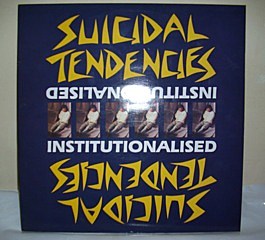
. . .
SUICIDAL TENDENCIES – JOIN THE ARMY / DÉJÀ VU 2010 US TOUR
Remaining dates
10/19 Phoenix Theatre- Petaluma, CA
10/20 Fillmore – San Francisco, CA
10/22 House Of Blues – Las Vegas, NV
10/24 Pima County Fairground – Tucson, AZ
10/26 Black Sheep – Colorado Springs, CO
10/28 Alrosa Villa – Columbus, OH
10/29 Harpo’s – Detroit, MI
10/30 Eagles – Milwaukee, WI
10/31 Peabody’s – Cleveland, OH
11/02 Pops – St. Louis, MO
11/04 Warehouse Live – Houston, TX
11/06 Palladium Showroom – Dallas, TX
11/07 Fun Fun Fun Fest – Austin, TX
11/09 State Theatre – Tampa, FL
11/10 Firestone – Orlando, FL
11/12 9:30 Club – Washington, DC
11/13 Palladium – Worcester, MA
11/14 Terminal 5 – New York, NY
11/15 Altar Bar – Pittsburgh, PA
11/17 Metro – Chicago, IL
11/18 Cabooze – Minneapolis, MN
11/20 Summit – Denver, CO
11/21 Sunshine Theater – Albuquerque, NM
. . .
